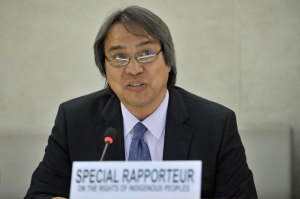The Congress Co-Chairs last week hosted the UN Special Rapporteur on the rights of Indigenous people , James Anaya (picture above) on his visit to Australia to meet with Aboriginal and Torres Strait Islander traditional owners as well as with representatives from peak organisations and communities.
Refer NACCHO recent communique United Nations (Joint intervention delivered by Mr Justin Mohamed)
He also spoke with NGOs, government and industry as part of his international study on extractive industries.
The Co-Chairs specifically thanked the Njamal people for hosting them and Professor Anaya, on a visit to the site of their joint venture agreement with Fortescue Metals Group (FMG) in the Pilbara.
Co-Chair Jody Broun said the visit showed there are still deep concerns about maintaining culture and protecting significant sites while negotiating fair deals from mining companies that deliver opportunities.
“The Njamal people were upfront about the long process to get where they have with FMG and we support and respect them in their fight to get what they felt was necessary,” she said.
“They are cultural guardians for sites of national and international significance and they must be supported by all parties in that.
“We had the opportunity to meet with several groups in the area and it’s important to say there are different experiences in each negotiation.
“If anything, these visits showed us why it’s vital that our peoples are supported in their self-determination with standards based on a rights framework and that State and Federal legislation must be consistent with that framework,” she said.
Congress Co-Chair Les Malezer said that now more than ever, Aboriginal peoples need to be prepared and informed on the impacts of mining.
“Our people are the true owners of the land and must be able to make decisions regarding the protections of their sacred sites and any arrangements for mining or exploration on their lands, including how benefits from mining are shared with the First Peoples,” he said.
Professor Anaya thanked the Congress for hosting him.
“The broad range of information I received from a large number of sources first-hand at both the two-day meeting in Melbourne and during the Pilbara visit has been an invaluable contribution to my global study on extractive industries on or near Indigenous peoples lands,” he said.
A full summary of the meeting will be available soon. More info at nationalcongress.com.au/congress-events/first-peoples-and-extractive-industries.
• Click here for full information on the round table – including background information, the agenda, participants and documents from the Special Rapporteur
• Click here to read a summary of the proceedings from the first day of the meeting
• Click here to read an updated version of the Special Rapporteur’s report
• Click here to read the United Nations Declaration on the Rights of Indigenous Peoples.
Liz Willis
Media Manager
National Congress of Australia’s First Peoples
Ph: 02 8070 3100
M: 0457 877 408
